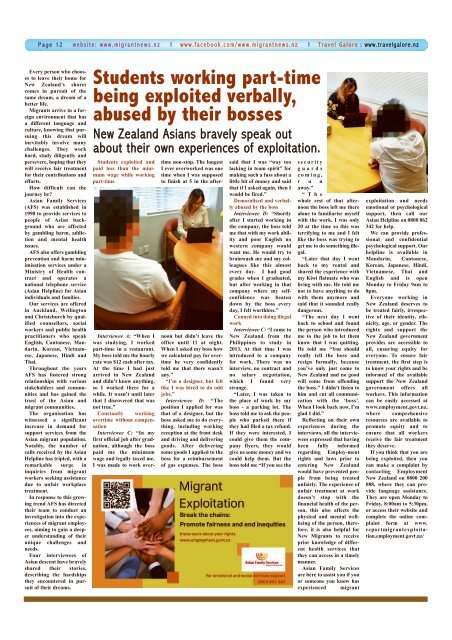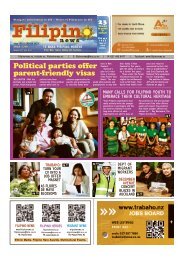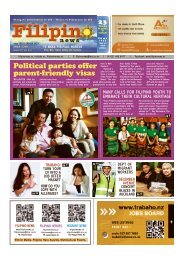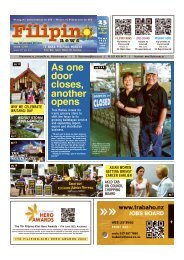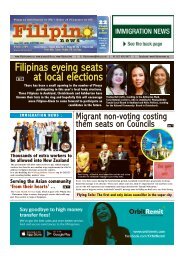MIGRANT NEWS Sept 2023
Migrant News is New Zealand's Only Newspaper reaching a cross-section of the ethnic communities. Celebrating our 33rd Year of Publication. www.migrantnews.nz email: migrantnews@xtra.co.nz mobile: + 6427 495 8477
Migrant News is New Zealand's Only Newspaper reaching a cross-section of the ethnic communities.
Celebrating our 33rd Year of Publication.
www.migrantnews.nz
email: migrantnews@xtra.co.nz
mobile: + 6427 495 8477
You also want an ePaper? Increase the reach of your titles
YUMPU automatically turns print PDFs into web optimized ePapers that Google loves.
P a g e 1 2 w e b s i t e : w w w . m i g r a n t n e w s . n z I w w w . f a c e b o o k . c o m / w w w . m i g r a n t n e w s . n z I T r a v e l G a l o r e : www.travelgalore.nz<br />
Every person who chooses<br />
to leave their home for<br />
New Zealand’s shores<br />
comes in pursuit of the<br />
same dream, a dream of a<br />
better life.<br />
Migrants arrive in a foreign<br />
environment that has<br />
a different language and<br />
culture, knowing that pursuing<br />
this dream will<br />
inevitably involve many<br />
challenges. They work<br />
hard, study diligently and<br />
persevere, hoping that they<br />
will receive fair treatment<br />
for their contributions and<br />
efforts.<br />
How difficult can the<br />
journey be?<br />
Asian Family Services<br />
(AFS) was established in<br />
1998 to provide services to<br />
people of Asian background<br />
who are affected<br />
by gambling harm, addiction<br />
and mental health<br />
issues.<br />
AFS also offers gambling<br />
prevention and harm minimisation<br />
services under a<br />
Ministry of Health contract<br />
and operates a<br />
national telephone service<br />
(Asian Helpline) for Asian<br />
individuals and families.<br />
Our services are offered<br />
in Auckland, Wellington<br />
and Christchurch by qualified<br />
counsellors, social<br />
workers and public health<br />
practitioners who speak<br />
English, Cantonese, Mandarin,<br />
Korean, Vietnamese,<br />
Japanese, Hindi and<br />
Thai.<br />
Throughout the years<br />
AFS has fostered strong<br />
relationships with various<br />
stakeholders and communities<br />
and has gained the<br />
trust of the Asian and<br />
migrant communities.<br />
The organisation has<br />
witnessed a significant<br />
increase in demand for<br />
support services from the<br />
Asian migrant population.<br />
Notably, the number of<br />
calls received by the Asian<br />
Helpline has tripled, with a<br />
remarkable surge in<br />
inquiries from migrant<br />
workers seeking assistance<br />
due to unfair workplace<br />
treatment.<br />
In response to this growing<br />
trend AFS has directed<br />
their team to conduct an<br />
investigation into the experiences<br />
of migrant employees,<br />
aiming to gain a deeper<br />
understanding of their<br />
unique challenges and<br />
needs.<br />
Four interviewees of<br />
Asian descent have bravely<br />
shared their stories,<br />
describing the hardships<br />
they encountered in pursuit<br />
of their dreams.<br />
Students working part-time<br />
being exploited verbally,<br />
abused by their bosses<br />
New Zealand Asians bravely speak out<br />
about their own experiences of exploitation.<br />
Students exploited and<br />
paid less than the minimum<br />
wage while working<br />
part-time<br />
Interviewee A: “When I<br />
was studying, I worked<br />
part-time in a restaurant.<br />
My boss told me the hourly<br />
rate was $12 cash after tax.<br />
At the time I had just<br />
arrived in New Zealand<br />
and didn’t know anything,<br />
so I worked there for a<br />
while. It wasn’t until later<br />
that I discovered that was<br />
not true.”<br />
Constantly working<br />
overtime without compensation<br />
Interviewee C: “In my<br />
first official job after graduation,<br />
although the boss<br />
paid me the minimum<br />
wage and legally taxed me,<br />
I was made to work overtime<br />
non-stop. The longest<br />
I ever overworked was one<br />
time when I was supposed<br />
to finish at 5 in the afternoon<br />
but didn’t leave the<br />
office until 11 at night.<br />
When I asked my boss how<br />
we calculated pay for overtime<br />
he very confidently<br />
told me that there wasn’t<br />
any.”<br />
“I’m a designer, but felt<br />
like I was hired to do odd<br />
jobs.”<br />
Interviewee D: “The<br />
position I applied for was<br />
that of a designer, but the<br />
boss asked me to do everything,<br />
including working<br />
reception at the front desk<br />
and driving and delivering<br />
goods. After delivering<br />
some goods I applied to the<br />
boss for a reimbursement<br />
of gas expenses. The boss<br />
said that I was “way too<br />
lacking in team spirit” for<br />
making such a fuss about a<br />
little bit of money and said<br />
that if I asked again, then I<br />
would be fired.”<br />
Demoralised and verbally<br />
abused by the boss<br />
Interviewee D: “Shortly<br />
after I started working in<br />
the company, the boss told<br />
me that with my work ability<br />
and poor English no<br />
western company would<br />
want me. He would try to<br />
brainwash me and my colleagues<br />
like this almost<br />
every day. I had good<br />
grades when I graduated,<br />
but after working in that<br />
company where my selfconfidence<br />
was beaten<br />
down by the boss every<br />
day, I felt worthless.”<br />
Conned into doing illegal<br />
work<br />
Interviewee C: “I came to<br />
New Zealand from the<br />
Philippines to study in<br />
2013. At that time I was<br />
introduced to a company<br />
for work. There was no<br />
interview, no contract and<br />
no salary negotiation,<br />
which I found very<br />
strange.<br />
“Later, I was taken to<br />
the place of work by my<br />
boss - a parking lot. The<br />
boss told me to ask the people<br />
who parked there if<br />
they had filed a tax refund.<br />
If they were interested, I<br />
could give them the company<br />
flyers, they would<br />
give us some money and we<br />
could help them. But the<br />
boss told me “If you see the<br />
security<br />
guards<br />
coming,<br />
r u n<br />
away.”<br />
“ T h e<br />
whole rest of that afternoon<br />
the boss left me there<br />
alone to familiarise myself<br />
with the work. I was only<br />
20 at the time so this was<br />
terrifying to me and I felt<br />
like the boss was trying to<br />
get me to do something illegal.<br />
“Later that day I went<br />
back to my rental and<br />
shared the experience with<br />
my Kiwi flatmate who was<br />
living with me. He told me<br />
not to have anything to do<br />
with them anymore and<br />
said that it sounded really<br />
dangerous.<br />
“The next day I went<br />
back to school and found<br />
the person who introduced<br />
me to the job to let them<br />
know that I was quitting.<br />
He told me “You should<br />
really tell the boss and<br />
resign formally, because<br />
you’ve only just come to<br />
New Zealand and no good<br />
will come from offending<br />
the boss.” I didn’t listen to<br />
him and cut all communication<br />
with the ‘boss’.<br />
When I look back now, I’m<br />
glad I did.”<br />
Reflecting on their own<br />
experiences during the<br />
interviews, all the interviewees<br />
expressed that having<br />
been fully informed<br />
regarding Employ-ment<br />
rights and laws prior to<br />
entering New Zealand<br />
would have prevented people<br />
from being treated<br />
unfairly. The experience of<br />
unfair treatment at work<br />
doesn’t stop with the<br />
financial health of the person,<br />
this also affects the<br />
physical and mental wellbeing<br />
of the person, therefore,<br />
it is also helpful for<br />
New Migrants to receive<br />
prior knowledge of different<br />
health services that<br />
they can access in a timely<br />
manner.<br />
Asian Family Services<br />
are here to assist you if you<br />
or someone you know has<br />
experienced migrant<br />
exploitation and needs<br />
emotional or psychological<br />
support, then call our<br />
Asian Helpline on 0800 862<br />
342 for help.<br />
We can provide professional<br />
and confidential<br />
psychological support. Our<br />
helpline is available in<br />
Mandarin, Cantonese,<br />
Korean, Japanese, Hindi,<br />
Vietnamese, Thai and<br />
English and is open<br />
Monday to Friday 9am to<br />
8pm.<br />
Everyone working in<br />
New Zealand deserves to<br />
be treated fairly, irrespective<br />
of their identity, ethnicity,<br />
age, or gender. The<br />
rights and support the<br />
New Zealand government<br />
provides are accessible to<br />
all, ensuring equity for<br />
everyone. To ensure fair<br />
treatment, the first step is<br />
to know your rights and be<br />
informed of the available<br />
support the New Zealand<br />
government offers all<br />
workers. This information<br />
can be easily accessed at<br />
www.employment.govt.nz,<br />
where comprehensive<br />
resources are available to<br />
promote equity and to<br />
ensure that all workers<br />
receive the fair treatment<br />
they deserve.<br />
If you think that you are<br />
being exploited, then you<br />
can make a complaint by<br />
contacting Employment<br />
New Zealand on 0800 200<br />
088, where they can provide<br />
language assistance.<br />
They are open Monday to<br />
Friday, 8:00am to 5:30pm,<br />
or access their website and<br />
complete the online complaint<br />
form at www.<br />
reportmigrantexploitation.employment.govt.nz/


